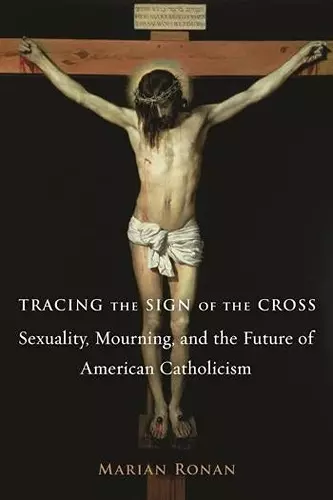Tracing the Sign of the Cross
Sexuality, Mourning, and the Future of American Catholicism
Format:Hardback
Publisher:Columbia University Press
Published:29th May '09
Currently unavailable, and unfortunately no date known when it will be back

Tracing the Sign of The Cross is one of only a handful of books on American Catholicism that goes beyond being simply competent, well-executed, and well-written to open up the possibility of our rethinking what it means to be a Catholic in America. -- David Harrington Watt, Temple University, author of Bible Carrying Christians: Conservative Protestants and Social Power Marian Ronan has a strong, unflinching, often lyrical voice, and she moves with grace through questions that are frequently daunting in their own right and rarely posed together. Although deeply informed by literary and psychoanalytic theory, as well as Catholic history and theology, Ronan wears her learning lightly enough so that readers who would not normally encounter such texts will still find her work accessible and engaging. An important book. -- Tracy Fessenden, author of Culture and Redemption: Religion, the Secular, and American Literature Tracing the Sign of the Cross is a genuinely pathbreaking book, offering an innovative interpretation of the worldview of contemporary American Catholics. Through a daring combination of literary approaches and psychoanalysis, it offers valuable insight into the agendas, conscious or otherwise, of so many of those engaged in the culture wars that have raged within American Catholicism in recent decades. -- Philip Jenkins, author of Pedophiles and Priests and The New Anti-Catholicism By finding the sign of the cross in post-Vatican II American Catholicism, Marian Ronan makes important discoveries for Catholic theology. Theologians will be challenged and engaged by her book. -- Margaret O'Gara, professor, SSJT Chair in Systematic Theology, University of St. Michael's College, Toronto
Following World War II, millions of U.S. Catholics were poised to attain the American dream, while at Vatican Council II, the liberal vision of the church seemed finally to triumph. Yet by the end of the twentieth century, American Catholicism was in crisis, plagued by grave ideological divisions; a dwindling pool of priests, nuns, and monks; and declining financial resources. What went wrong? In Tracing the Sign of the Cross, Marian Ronan identifies the roots of this crisis in an inability on the part of American Catholics to mourn a variety of losses suffered in the last third of the twentieth century. Drawing on the work of four writers with distinctively Catholic imaginations, Ronan argues that endless battles over sexuality and gender in particular have kept American Catholics from confronting these losses, thus jeopardizing the future of Catholicism. The writings of James Carroll, the archetypal liberal American Catholic, form the basis of Ronan's exploration of the church in the decades following Vatican II. Carroll's writings, especially his memoir, An American Requiem, seem to embody the very engagement with loss Ronan calls for-yet a highly gendered pattern of resistance to mourning emerges throughout Carroll's writing. Ronan discerns a similar Catholic "inability to mourn" in the early works of the novelist Mary Gordon, the feminist philosopher of science Donna Haraway, and the essayist Richard Rodriguez. While Gordon's characters gradually engage their profound losses, Haraway's female cyborg dons a crown of thorns, and Rodriguez confronts his own gay/brown identity-contributing in all cases to a new and chastened vision of the church. Framed by the author's own personal experience, Tracing the Sign of the Cross is an intimate and persuasive account of Catholic possibility in a postmodern world.
[T]he book will have some real and lasting use as a primary source American Catholic Studies
ISBN: 9780231147026
Dimensions: unknown
Weight: unknown
216 pages